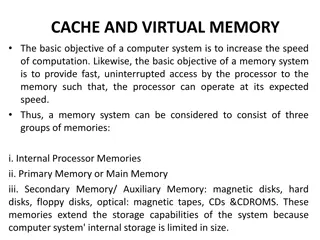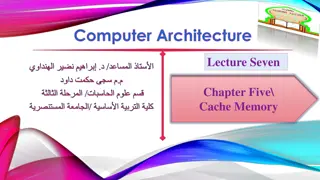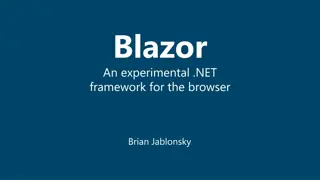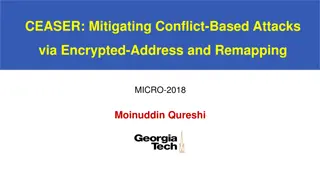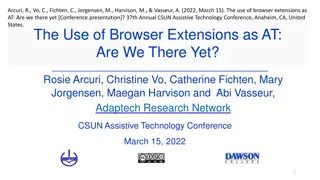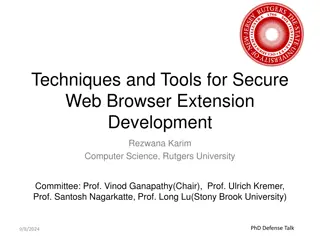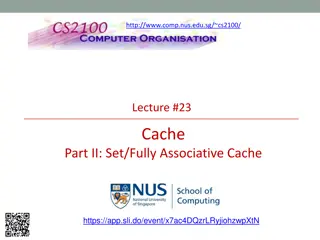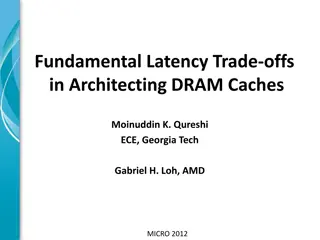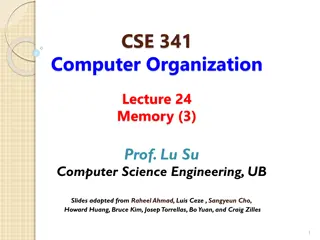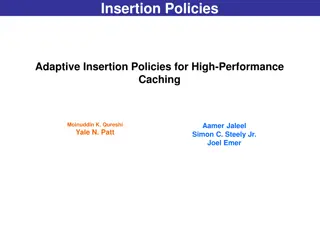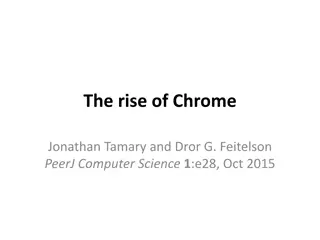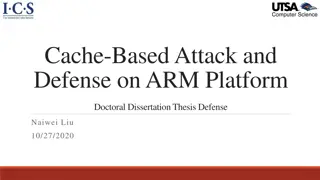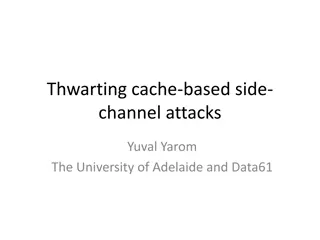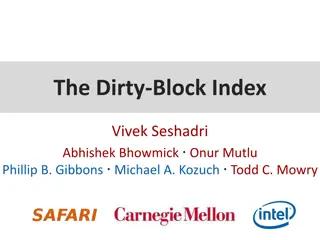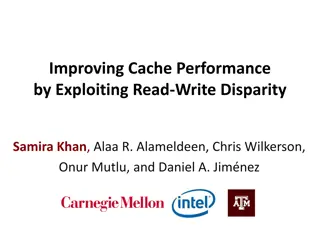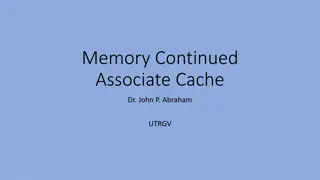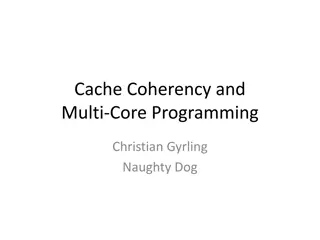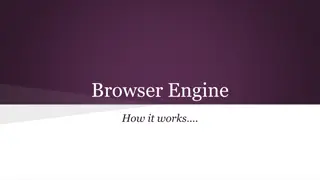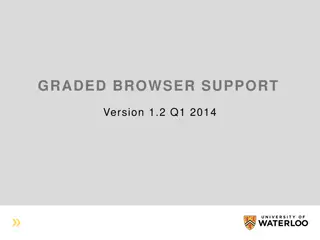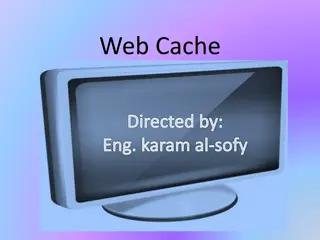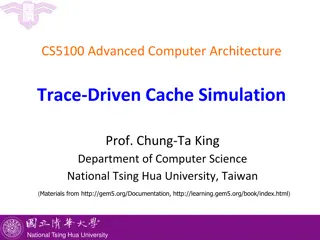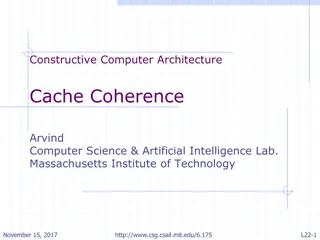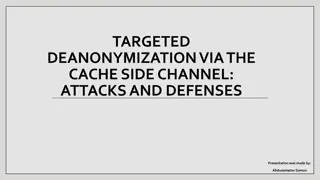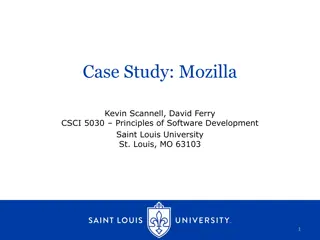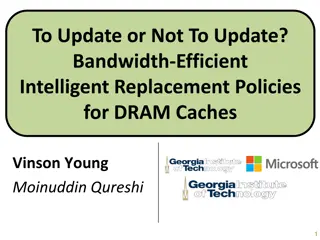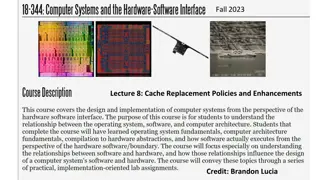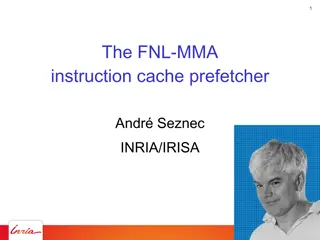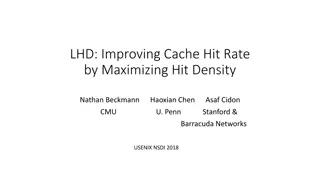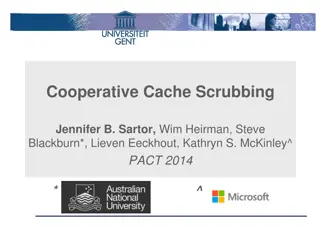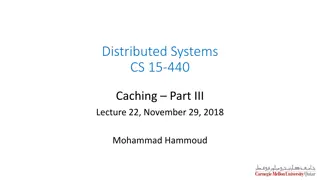QuickBooks Online Running Slow
If QuickBooks Online is running slowly, there are several actions you can take to improve its performance. First, make sure your internet connection is stable. Then, clear your browser's cache and cookies to remove unnecessary data. Another option is to close unused tabs and programs to free up reso
1 views • 3 slides
Understanding Cache and Virtual Memory in Computer Systems
A computer's memory system is crucial for ensuring fast and uninterrupted access to data by the processor. This system comprises internal processor memories, primary memory, and secondary memory such as hard drives. The utilization of cache memory helps bridge the speed gap between the CPU and main
1 views • 47 slides
Understanding Shared Memory Architectures and Cache Coherence
Shared memory architectures involve multiple CPUs sharing one memory with a global address space, with challenges like the cache coherence problem. This summary delves into UMA and NUMA architectures, addressing issues like memory latency and bandwidth, as well as the bus-based UMA and NUMA shared m
0 views • 27 slides
Understanding Cache Memory in Computer Architecture
Cache memory is a crucial component in computer architecture that aims to accelerate memory accesses by storing frequently used data closer to the CPU. This faster access is achieved through SRAM-based cache, which offers much shorter cycle times compared to DRAM. Various cache mapping schemes are e
2 views • 20 slides
Troubleshooting Invalid Login Credential Issue on e-Way Bill Portal
Some users are encountering an "Invalid Login Credentials" error while trying to access the Maharashtra GST Department's e-Way Bill Helpdesk portal at ewaybillgst.gov.in. To resolve this issue, it is recommended to clear browser cache and cookies. Additionally, ensure you are using a recommended bro
0 views • 13 slides
Exploring Blazor: An Experimental .NET Framework for the Browser
Blazor is an experimental .NET framework that enables C# and Razor developers to build web applications that run directly in the browser. Utilizing WebAssembly for client-side execution, Blazor provides a unique approach to web development, allowing for seamless integration of C# code with the brows
0 views • 39 slides
GPU Scheduling Strategies: Maximizing Performance with Cache-Conscious Wavefront Scheduling
Explore GPU scheduling strategies including Loose Round Robin (LRR) for maximizing performance by efficiently managing warps, Cache-Conscious Wavefront Scheduling for improved cache utilization, and Greedy-then-oldest (GTO) scheduling to enhance cache locality. Learn how these techniques optimize GP
0 views • 21 slides
Understanding Shared Memory Architectures and Cache Coherence
Shared memory architectures involve multiple CPUs accessing a common memory, leading to challenges like the cache coherence problem. This article delves into different types of shared memory architectures, such as UMA and NUMA, and explores the cache coherence issue and protocols. It also highlights
2 views • 27 slides
Mitigating Conflict-Based Attacks in Modern Systems
CEASER presents a solution to protect Last-Level Cache (LLC) from conflict-based cache attacks using encrypted address space and remapping techniques. By avoiding traditional table-based randomization and instead employing encryption for cache mapping, CEASER aims to provide enhanced security with n
1 views • 21 slides
Browser Extensions as Assistive Technology: Enhancing Accessibility
Explore the potential of browser extensions as assistive technology in a presentation from the 37th Annual CSUN Assistive Technology Conference. Learn how Chrome extensions can support students with disabilities, providing safe downloads, alternative AT options, and unique functions, all while enhan
0 views • 32 slides
Techniques and Tools for Secure Web Browser Extension Development
Explore the world of web browser extensions with Rezwana Karim's research at Rutgers University, focusing on secure development techniques, extensible platforms, and the implications of vulnerable extensions on platform security. Discover the popularity and impact of browser extensions in today's di
1 views • 66 slides
Amoeba Cache: Adaptive Blocks for Memory Hierarchy Optimization
The Amoeba Cache introduces adaptive blocks to optimize memory hierarchy utilization, eliminating waste by dynamically adjusting storage allocations. Factors influencing cache efficiency and application-specific behaviors are explored. Images and data distributions illustrate the effectiveness of th
0 views • 57 slides
Understanding Cache Memory Designs: Set vs Fully Associative Cache
Exploring the concepts of cache memory designs through Aaron Tan's NUS Lecture #23. Covering topics such as types of cache misses, block size trade-off, set associative cache, fully associative cache, block replacement policy, and more. Dive into the nuances of cache memory optimization and understa
0 views • 42 slides
Architecting DRAM Caches for Low Latency and High Bandwidth
Addressing fundamental latency trade-offs in designing DRAM caches involves considerations such as memory stacking for improved latency and bandwidth, organizing large caches at cache-line granularity to minimize wasted space, and optimizing cache designs to reduce access latency. Challenges include
0 views • 32 slides
Understanding Cache Memory Organization in Computer Systems
Exploring concepts such as set-associative cache, direct-mapped cache, fully-associative cache, and replacement policies in cache memory design. Delve into topics like generality of set-associative caches, block mapping in different cache architectures, hit rates, conflicts, and eviction strategies.
0 views • 35 slides
Adaptive Insertion Policies for High-Performance Caching
Explore the concept of adaptive insertion policies in high-performance caching systems, focusing on mitigating the issue of Dead on Arrival (DoA) lines by making simple changes to cache insertion policies. Understanding cache replacement components, victim selection, and insertion policy can signifi
0 views • 15 slides
The Rise of Chrome: A Technical Comparison with Competing Browsers
Since 2009, Google Chrome has become the dominant desktop browser, outpacing competitors like Internet Explorer and Firefox. This study delves into the technical aspects that have contributed to Chrome's rise, including performance benchmarks, features, and adherence to industry standards. The metho
0 views • 40 slides
Browser News and Root Inclusion Process Updates
The Browser news reveals new policies and strategies to enhance user experience, including the clarification of inclusion processes and removal of certain roots. Additionally, updates on the Root inclusion process for CAs are mentioned, with scheduled quarterly updates starting in October 2018. Sugg
0 views • 6 slides
Guide to Clearing Browser Cache for Better Online Experience
Learn how to clear cache on Internet Explorer, Firefox, and Chrome to avoid distorted data and inaccurate information during a weekend release. Follow simple steps provided for each browser to ensure smooth browsing experience on BT Wholesale Online. Access the user guide via My BT Wholesale.
0 views • 8 slides
Efficient Handling of Cache Miss Rate in FPGAs
This study focuses on improving cache miss rate efficiency in FPGAs through the implementation of non-blocking caches and efficient Miss Status Holding Registers (MSHRs). By tracking more outstanding misses and utilizing memory-level parallelism, this approach proves to be more cost-effective than s
0 views • 44 slides
Cache-Based Attack and Defense on ARM Platform - Doctoral Dissertation Thesis Defense
Recent research efforts have focused on securing ARM platforms due to their prevalence in the market. The study delves into cache-based security threats and defenses on ARM architecture, emphasizing the risks posed by side-channel attacks on the Last-Level Cache. It discusses the effectiveness of si
0 views • 44 slides
Defending Against Cache-Based Side-Channel Attacks
The content discusses strategies to mitigate cache-based side-channel attacks, focusing on the importance of constant-time programming to avoid timing vulnerabilities. It covers topics such as microarchitectural attacks, cache structure, Prime+Probe attack, and the Bernstein attack on AES. Through d
0 views • 25 slides
Efficient Cache Management using The Dirty-Block Index
The Dirty-Block Index (DBI) is a solution to address inefficiencies in caches by removing dirty bits from cache tag stores, improving query response efficiency, and enabling various optimizations like DRAM-aware writeback. Its implementation leads to significant performance gains and cache area redu
0 views • 44 slides
Improving Cache Performance Through Read-Write Disparity
This study explores how exploiting the difference between read and write requests can enhance cache performance by prioritizing read over write operations. By dynamically partitioning the cache and protecting lines with more read hits, the proposed method demonstrates significant performance improve
0 views • 27 slides
Understanding Cache Memory in Computer Systems
Explore the intricate world of cache memory in computer systems through detailed explanations of how it functions, its types, and its role in enhancing system performance. Delve into the nuances of associative memory, valid and dirty bits, as well as fully associative examples to grasp the complexit
0 views • 15 slides
Understanding Cache Coherency and Multi-Core Programming
Explore the intricate world of cache coherency and multi-core programming through images and descriptions covering topics such as how cache shares data between cores, maintaining data consistency, CPU architecture, memory caching, MESI protocol, and interconnect bus communication.
0 views • 97 slides
Understanding How Browser Engines Work
Browser engines play a crucial role in how web browsers retrieve, present, and traverse information resources on the World Wide Web. This process involves fetching a page, interpreting URLs, rendering content with layout engines, and utilizing components like the host application. Popular layout eng
0 views • 10 slides
University of Waterloo Browser Support Guidelines
The University of Waterloo has introduced a graded browser support system, emphasizing that support does not mean identical experiences for all users. The purpose is to ensure accessibility and prioritize content consumption based on browser capabilities. The guidelines introduce grades of support a
0 views • 21 slides
Understanding Web Caching: An Overview
Web caching, implemented through various types of caches like browser cache, proxy cache, and gateway cache, plays a crucial role in improving content availability, reducing network congestion, and enhancing user experience by saving bandwidth and decreasing latency. It addresses the challenges pose
0 views • 27 slides
Trace-Driven Cache Simulation in Advanced Computer Architecture
Trace-driven simulation is a key method for assessing memory hierarchy performance, particularly focusing on hits and misses. Dinero IV is a cache simulator used for memory reference traces without timing simulation capabilities. The tool aids in evaluating cache hit and miss results but does not ha
0 views • 13 slides
Understanding Cache Coherence in Computer Architecture
Exploring the concept of cache coherence in computer architecture, this content delves into the challenges and solutions associated with maintaining consistency among multiple caches in modern systems. It discusses the importance of coherence in shared memory systems and the use of cache-coherent me
0 views • 24 slides
Targeted Deanonymization via the Cache Side Channel: Attacks and Defenses
This presentation by Abdusamatov Somon explores targeted deanonymization through cache side-channel attacks, focusing on leaky resource attacks and cache-based side-channel attacks. It discusses the motivation behind these attacks, methods employed, potential defenses, and the evaluation of such att
0 views • 16 slides
Clearing Browser Cache and Cookies: Google Chrome Edition
In this guide, you will learn how to clear the browser cache and cookies in Google Chrome. Follow the easy steps to ensure smooth browsing experience. From accessing your browser settings to selecting the right options, this tutorial covers it all. Keep your browser running efficiently by regularly
0 views • 6 slides
Evolution of Mozilla: From Browser Wars to Open-Source Development
The evolution of Mozilla from the Browser Wars era to becoming a pioneer in open-source community development is highlighted. Starting with Mosaic and Netscape Navigator, Mozilla transformed into the popular Firefox browser and expanded into various projects under the Mozilla Foundation and Corporat
0 views • 22 slides
Intelligent DRAM Cache Strategies for Bandwidth Optimization
Efficiently managing DRAM caches is crucial due to increasing memory demands and bandwidth limitations. Strategies like using DRAM as a cache, architectural considerations for large DRAM caches, and understanding replacement policies are explored in this study to enhance memory bandwidth and capacit
0 views • 23 slides
Cache Replacement Policies and Enhancements in Fall 2023 Lecture 8 by Brandon Lucia
The Fall 2023 Lecture 8 by Brandon Lucia delves into cache replacement policies and enhancements for efficient memory management. The session covers the intricacies of replacement policies such as Round Robin, discussing evictions and block prioritization within cache sets. Visual aids and examples
0 views • 60 slides
Efficient Instruction Cache Prefetching Techniques
Discussion on issues and solutions related to instruction cache prefetching, including trigger timing, next-line prefetching, I-Shadow cache, and footprint prediction. Evaluation results show improved performance with FNL methodology compared to traditional prefetching methods.
0 views • 24 slides
Maximizing Cache Hit Rate with LHD: An Overview
This presentation discusses the concept of Least Hit Density (LHD) for improving cache hit rates, focusing on the challenges and benefits of key-value caches in maximizing performance through efficient eviction policies like LRU. It emphasizes the importance of cache hit rates in enhancing web appli
0 views • 40 slides
Cooperative Cache Scrubbing for Efficient Memory Management in Multicore Systems
Cooperative Cache Scrubbing optimizes memory management in multicore systems by efficiently handling short-lived application objects and reducing unnecessary data writes to memory. By communicating semantic information to hardware caches, dead lines are scrubbed, dirty bits unset, and unnecessary fe
0 views • 40 slides
Cache Replacement Policies in Distributed Systems: Key Considerations and Challenges
Explore the critical aspects of cache replacement policies in distributed systems, including cache consistency, update propagation, eviction strategies, and working sets. Dive into the implications of different policies like LRU and discover why certain access patterns may not be efficiently handled
0 views • 22 slides

